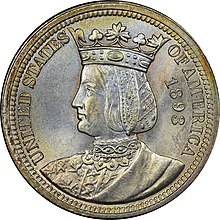Columbian Exposition quarter dollar
| United States | |
| Value | 25 cents (.25 US$) |
|---|---|
| Mass | 6.25 g |
| Diameter | 24.3 mm |
| Edge | reeded |
| Composition |
|
| Silver | .18084 troy oz |
| Years of minting | 1893 |
| Obverse | |
 |
|
| Design | Queen Isabella I |
| Designer | Charles E. Barber |
| Design date | 1893 |
| Reverse | |
 |
|
| Design | Kneeling female with distaff and spindle, symbolizing women's industry. |
| Designer | Charles E. Barber after a sketch by George T. Morgan |
| Design date | 1893 |
The Isabella quarter or Columbian Exposition quarter was a United States commemorative coin struck in 1893. Congress authorized the piece at the request of the Board of Lady Managers of the World's Columbian Exposition. The quarter depicts the Spanish queen Isabella I of Castile, who sponsored Columbus's voyages to the New World. It was designed by Bureau of the Mint Chief Engraver Charles E. Barber, and is the only U.S. commemorative of that denomination that was not intended for circulation.
The Board of Lady Managers, headed by Chicago socialite Bertha Palmer, wanted a woman to design the coin and engaged Caroline Peddle, a sculptor. Peddle left the project after disagreements with Mint officials, who then decided to have Barber do the work. The reverse design, showing a kneeling woman spinning flax, with a distaff in her left hand and a spindle in her right, symbolizes women's industry and was based on a sketch by Assistant Engraver George T. Morgan.
The quarter's design was deprecated in the numismatic press. The coin did not sell well at the Exposition; its price of $1 was the same as for the Columbian half dollar, and the quarter was seen as the worse deal. Nearly half of the authorized issue was returned to the Mint to be melted; thousands more were purchased at face value by the Lady Managers and entered the coin market in the early 20th century. Today, they are popular with collectors and range in value between $450 in almost uncirculated and $6,000 in near-pristine condition according to the 2014 edition of R.S. Yeoman's A Guide Book of United States Coins.
...
Wikipedia
